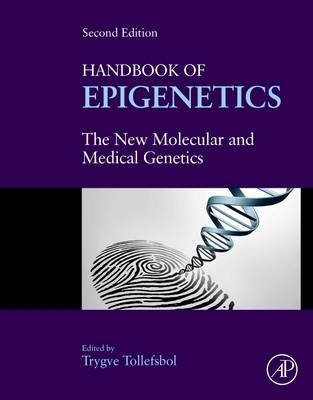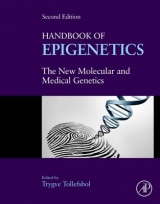
Handbook of Epigenetics
Academic Press Inc (Verlag)
978-0-12-375709-8 (ISBN)
- Titel erscheint in neuer Auflage
- Artikel merken
Epigenetics is considered by many to be the "new genetics" because of the overwhelming evidence of the contribution of non-genetic factors such as nutrition, environment, and chemical exposure on gene expression. The effects of epigenetics are vast, including tissue/organ regeneration, X-chromosome inactivation, and stem cell differentiation and genomic imprinting and aging. Aberrations of epigenetics influence many diseases for which clinical intervention is already in place, and many novel epigenetic therapies for cancer, immune disorders, neurological and metabolic disorders, and imprinting diseases are on the horizon.
This comprehensive collection of reviews written by leaders in the field of epigenetics provides a broad view of this important and evolving topic. From molecular mechanisms and epigenetic technology to discoveries in human disease and clinical epigenetics, the nature and applications of the science will be presented for those with interests ranging from the fundamental basis of epigenetics to therapeutic interventions for epigenetic-based disorders.
Dr. Tollefsbol is a Distinguished Professor of Biology and a Senior Scientist in the O’Neal Comprehensive Cancer Center, Integrative Center for Aging Research, Nutrition Obesity Research Center, University Wide Microbiome Center, and the Comprehensive Diabetes Center at the University of Alabama at Birmingham (UAB). He is Director of the UAB Cell Senescence Culture Facility which he established in 1999. Dr. Tollefsbol trained as a Postdoctoral Fellow and Assistant Research Professor with members of the National Academy of Science at Duke University and the University of North Carolina. He earned doctorates in molecular biology and osteopathic medicine from the University of North Texas Health Sciences Center and his bachelor’s degree in Biology from the University of Houston. He has received prior funding from the NCI, NHLBI, NIMH and other federal institutes as well as the Glenn Foundation for Medical Research, Susan G. Komen for the Cure, the American Federation for Aging Research (AFAR), and the American Institute for Cancer Research (AICR) among many other sources.
1. Epigenetics: The New Science of Genetics
SECTION I: Molecular Mechanisms of Epigenetics
2. Mechanisms of DNA Methylation, Methy-CpG Recognition, and Demethylation in Mammals
3. Mechanisms of Histone Modifications
SECTION II: Additional Epigenetic Processes
4. The Epigenetics of Non-coding RNA
5. Prions and Prion-like Phenomena in Epigenetic Inheritance
6. Chromosomal Position Effects and Gene Variegation: Impact in Pathologies
7. Polycomb Mechanisms and Epigenetic Control of Gene Activity
SECTION III: Epigenetic Technology
8. Analysis of Gene-specific DNA Methylation
9. Methods for Assessing Genome-wide DNA Methylation
10. Methylation of Lysine-9 of Histone H3: Role in Heterochromatin Modulation and Tumorigenesis
11. Chromatin Modifications Distinguish Genomic Features and Physical Organization of the Nucleus
12. Assessing Epigenetic Information
SECTION IV: Model Organisms of Epigenetics
13. Epigenetics of Eukaryotic Microbes
14. Drosophila Epigenetics
15. Mouse Models of Epigenetic Inheritance
16. Epigenetic Regulatory Mechanisms in Plants
SECTION V: Metabolism and Epigenetics 17. Metabolic Regulation of DNA Methylation in Mammals
18. Dietary and Metabolic Compounds Affecting Chromatin Dynamics/Remodeling
SECTION VI: Functions of Epigenetics
19. Epigenetics, Stem Cells and Cellular Differentiation
20. Epigenetic Basis of Skeletal Muscle Regeneration
21. Epigenetics of X Chromosome Inactivation
22. Genomic Imprinting
23. Epigenetics of Memory Processes
24. Transgenerational Epigenetics
25. Aging Epigenetics
SECTION VII: Evolutionary Epigenetics 26. Epigenetics in Adaptive Evolution and Development
SECTION VIII: Epigenetic Epidemiology
27. The Effects of Diet on Epigenetic Processes
28. Environmental Agents and Epigenetics
29. Impact of Microbial Infections on the Human Epigenome and Carcinogenesis
30. DNA Methylation Profiles in the 5’-Upstream Region of the Human FMR1 Promoter and in an Adenovirus Transgenome
31. Population Pharmacoepigenomics
SECTION IX: Epigenetics and Human Disease
32. Cancer Epigenetics
33. The Role of Epigenetics in Immune Disorders
34. Epigenetics of Brain Disorders
35. Complex Metabolic Syndromes and Epigenetics
36. Imprinting Disorders in Humans
SECTION X: Epigenetic Therapy
37. Clinical Applications of Histone Deacetylase Inhibitors
| Verlagsort | San Diego |
|---|---|
| Sprache | englisch |
| Maße | 216 x 276 mm |
| Gewicht | 1760 g |
| Themenwelt | Studium ► 2. Studienabschnitt (Klinik) ► Humangenetik |
| Naturwissenschaften ► Biologie ► Genetik / Molekularbiologie | |
| Naturwissenschaften ► Biologie ► Mikrobiologie / Immunologie | |
| ISBN-10 | 0-12-375709-6 / 0123757096 |
| ISBN-13 | 978-0-12-375709-8 / 9780123757098 |
| Zustand | Neuware |
| Informationen gemäß Produktsicherheitsverordnung (GPSR) | |
| Haben Sie eine Frage zum Produkt? |
aus dem Bereich



